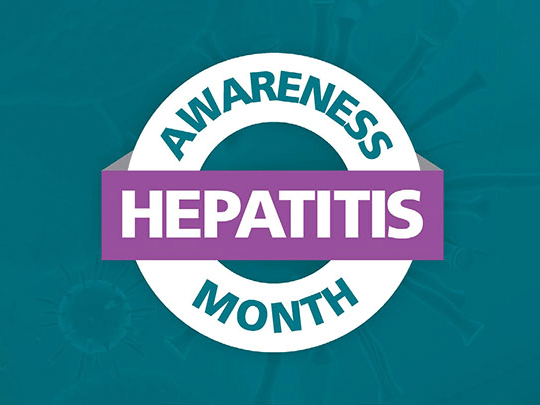Cross-posted from TargetHIVExit Disclaimer

Note: May’s observance of Hepatitis Awareness Month is an opportunity to highlight approaches to addressing the syndemic of HIV and viral hepatitis, approaches called for in both the National HIV/AIDS Strategy and the Viral Hepatitis National Strategic Plan.
A, B, and C. These are the three most common hepatitis viruses. The first two are preventable by vaccines. The third is curable.
These facts come from the latest Viral Hepatitis National Strategic Plan for the United States: A Roadmap to Elimination 2021-2025 (January 2021), which states in its Executive Summary: "the nation faces unprecedented hepatitis A outbreaks, progress on preventing hepatitis B has stalled, and hepatitis C rates nearly tripled from 2011 to 2018."
May is Hepatitis Awareness Month and May 19 is Hepatitis Testing Day.
Hepatitis C co-infection among persons with HIV is of particular concern as the disease progresses more rapidly and is more prevalent. From 15 to 30% of people with HIV are also infected with Hepatitis C, as cited in the Hepatitis C Coinfection chapterExit Disclaimer of the National HIV Curriculum. Coinfection rates are much higher among injection drug users who have HIV, according to CDC.
Fortunately, effective treatments for hepatitis C are available.
Hepatitis C Treatment
Hepatitis C treatments called Direct-Acting AntiviralsExit Disclaimer (DAAs) became available in recent years They are more effective than earlier interferon-based regimens. For the first time, persons infected with hepatitis C can be cured, with all-oral, once-daily treatment regimens that last 8-24 weeks. Efficacy rates for these medications are high (above 90%) for both hepatitis C monoinfected and HIV/hepatitis C coinfected people. Side effects or contraindications of these medications are minimal.
Moreover, studies have shown that hepatitis C treatment is effective for individuals with substance abuse disorders. See the AETC on Myths about Treating Substance Users with Hepatitis C VirusExit Disclaimer.

HHS guidelines recommend that all people with HIV be tested for HCV, with those testing positive be considered for HCV treatment. CDC Recommendations for Hepatitis C Screening Among Adults — United States, 2020 recommend expanded screening for all individuals over 18 years of age and testing for various groups, including people with HIV.
Clinician Resources
HRSA's HIV/AIDS Bureau has developed provider resources on hepatitis screening and treatment for use by Ryan White HIV/AIDS Program (RWHAP) agencies. These and other tools are summarized on the AETC National Coordinating Resource Center's (NCRC) viral hepatitis confection topic pageExit Disclaimer. Highlights include the HIV/HCV Coinfection: An AETC National CurriculumExit Disclaimer and the National HIV Curriculum's Hepatitis C CoinfectionExit Disclaimer section.
The HIV/HCV Coinfection: An AETC National Curriculum includes HIV/HCV Co-infection ResourcesExit Disclaimer for providers as well as patients and patient educators, like tools to engage patients in HCV care.
Hepatitis C and Planning - Incorporating Hepatitis C in Integrated HIV Prevention and Care PlanningExit Disclaimer is a webinar review of how select RWHAP jurisdictions are integrating hepatitis C services within their HIV care and prevention plans.
HCV/HIV Care Delivery
In addition to the AETC clinic-focused curricula and patient tools, HRSA's work on HCV/HIV coinfection care also includes identification of innovative interventions. RWHAP agencies are also using HRSA performance and data monitoring guidance to measure efforts and efficacy in providing care to HIV/HCV co-infected individuals. These initiatives, and resulting technical assistance tools, can be found in our Hepatitis topic pageExit Disclaimer. Highlights include:
- Hepatitis C Prescriber ToolkitExit Disclaimer, a directory of state-specific resources (prescribing restrictions, ADAP coverage, Medicare coverage) and contact information for all state programs.
- Curing Hepatitis C among People of Color Living with HIVExit Disclaimer. This SPNS initiative (2017-2020) focused on expanding a full array of services for HCV/HIV coinfected individuals, in collaboration with SAMHSA-funded substance abuse agencies. Among the products developed by the Curing Hepatitis C project were mobile apps for use by patients and staff (clinical and non-clinical) to educate clients and improve the patient/provider experience. See ConnQuer HepC and TACKLE ProgramExit Disclaimer and download their apps.
- Jurisdictional Approach to Curing Hepatitis C among HIV/HCV Coinfected People of ColorExit Disclaimer. This HRSA HCV SPNS initiative (2016-2019) focused on improving HCV services among HIV/HCV-coinfected people of color.
- Performance Measurement. The HRSA HIV/AIDS Bureau has a framework of resources to support RWHAP programs in monitoring the delivery of HIV care, inclusive of hepatitis. HAB's Performance Measures are comprised of multiple sets, with an adolescent/adult set of measures that includes specific measures addressing hepatitis B screening and vaccination and hepatitis C screening.
- Data MonitoringExit Disclaimer. HRSA's Ryan White Services Report, the RSR client-level data systemExit Disclaimer, is used by RWHAP recipients and subrecipients to collect performance measure data on hepatitis B screening and vaccination as well as hepatitis C screening.
Listen to insights on hepatitis care from HRSA and front-line RWHAP agencies in a range of workshopsExit Disclaimer convened at the 2020 Ryan White Conference on HIV Care and Treatment.